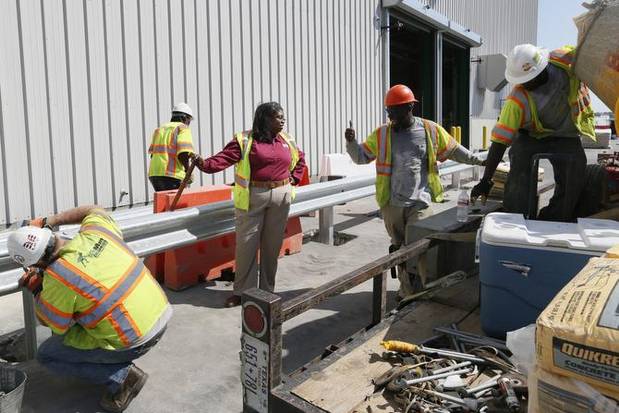By Arselia Gales
The Dallas Morning News.
Dallas business owner Eve Clark took a leap of faith when she started a construction company back in 2006.
Although there were risks associated with starting a business in a male-dominated field, the Chicago native, experienced in the industry, launched MEB Construction, a general contracting firm in Dallas.
“Having my own business allows me to set my own pace and manage my health,” said Clark, 43, who was diagnosed with multiple sclerosis 18 years ago.
Clark is one of many women who have started companies in male-dominated industries in North Texas and across the country in recent years.
Seven years ago, Plano resident Sandy Tabacinic launched Homecorp, a company that provides construction, remodeling, and architectural and interior design services to clients across North Texas.
Nationally, women are launching 1,200 businesses a day, up from an average of 740 a day in 2013, according to the fourth annual OPEN State of Women-Owned Business report, released this year.
The report, which uses data from the U.S. Census Bureau, also found that 4 of 10 new firms are started by women.
Texas ranks second in the United States for the fastest growth in the number of women-owned firms and has seen 98 percent growth between 1997 and 2014. The report estimates that the number of women-owned firms in Texas will reach 756,700 this year, with 207,900 in Dallas.
Besides more traditional businesses like health services and retail, women are taking on industries like construction, engineering and finance, the report found.
“Women-owned firms are starting and growing businesses in all industries, diversifying into sectors previously described as nontraditional for women,” the report says.
For example, the Women’s Business Council-Southwest, or WBCS, says that 21 percent of its 1,034 members are in architecture, construction and engineering.
Although it is not the majority, that sector is the largest industry group within the organization.
Other industries such as advertising, marketing and public relations represent only 6 percent of its membership.
The council provides resources and certification for women’s business enterprises in Texas, Arkansas, New Mexico and Oklahoma.
Certification
A business that is 51 percent or more owned, controlled and operated by women can receive women’s business enterprises certification through WBCS, a partner organization of the Women Business Enterprise National Council.
“Women make the vast majority of purchasing decisions in the country, and major corporations set goals to purchase a certain amount of items from women- and minority-owned business,” said Debbie Hurst, WBCS president.
MEB Construction, for instance, is WBE-certified as well as certified as a minority business enterprise and historically underutilized business.
Clark said these multiple certifications help expand her business reach across the community.
Although more women are starting businesses, Hurst said, there are still obstacles.
“As a small business, competing globally is a challenge,” she said. She also noted that many women-owned businesses have difficulty growing after hitting $1 million in revenue.
Although more women are starting construction businesses, the report shows that construction has one of the lowest concentrations of women-owned firms, at only 7 percent. Other industries have concentrations closer to 30 percent.
However, according to the report, women-owned firms in construction are most likely to make a high economic impact by generating $500,000 or more in annual revenue.
When it comes to maintaining her business in a male-dominated field, Clark highlighted the importance of learning to work within the community, forming partnerships and making her voice heard.
“Because it is still a male-dominated industry, you still have to tell people that you want to work; otherwise, they won’t consider you,” Clark said.
MEB Construction initially focused on facility maintenance. Now the focus has shifted to commercial renovations and project management.
She employs three workers as opposed to 20 when she started out, reflecting the cyclical nature of the business.
“It’s been a roller coaster,” she said. “We saw a 100 percent increase in revenue one year and experienced a 50 percent loss in the next year.” MEB Construction now has revenue of about $1 million.
To combat the cyclical nature of the industry, Clark is always looking for the next project. MEB Construction just finished repaving a parking lot at Dallas County Community College District’s headquarters downtown.
Likewise, Tabacinic, 43, said she works on six or seven projects simultaneously with Homecorp. She believes a woman in the construction industry offers a different perspective.
“It can be hard working in a male-dominated field, but the tides are changing,” Clark said. “Women are getting more involved in construction each day, and I don’t feel so alone anymore.”














































































































































































































































































































































































